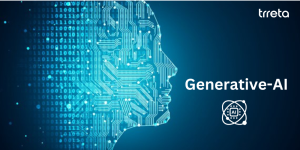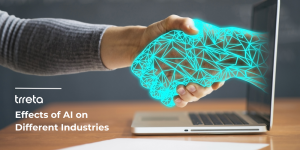Let's start with today's conversation agenda without further delay.
In today's rapidly advancing technological field, the fusion of artificial intelligence (AI) and machine learning (ML) has become a transformative force across diverse industries.
Creating AI and ML applications is a complex process that requires a huge amount of data, computational power, and expertise.
This is why integrating AI and machine learning with Laravel makes a difference!
As a PHP framework, Laravel is known for its elegance and user-friendly nature. It has adopted this revolution wholeheartedly by providing effortless AI and ML functionalities integration. In this blog post, we will learn the most recent advancements and methodologies for smoothly incorporating AI and ML capabilities into Laravel applications. This integration opens up many opportunities for developers and businesses, pushing them into a new generation of innovation and efficiency.
Why Integrate Machine Learning and AI into Your Applications?
Integrating AI and ML capabilities into Laravel offers numerous advantages:
-
Enhanced User Experience:
Leveraging AI-driven functionalities such as personalized recommendations, predictive analytics, and intelligent chatbots can upgrade user engagement and satisfaction.
-
Predictive Analytics:
By analyzing extensive datasets, AI empowers you to forecast trends, detect patterns, and anticipate outcomes, facilitating informed decision-making processes.
-
Fraud Detection:
Machine learning algorithms skillfully identify user behavior irregularities, helping to detect potentially fraudulent activities in real time and prompting alerts to mitigate risks.
-
Chatbots:
AI-driven chatbots are ready to offer round-the-clock customer support, streamlining interactions and saving businesses valuable time and resources.
How to Integrate Machine Learning and AI into Your Laravel Applications?
Integrating Machine Learning (ML) and Artificial Intelligence (AI) into Laravel applications can significantly increase functionality and offer valuable insights. This combination allows for more advanced data analysis, predictive modeling, and improved user experiences, making your application competent and more efficient. Here's a brief overview to help you begin:
-
Model Deployment with Algorithmia:
Deploying ML models into production can be challenging, especially for beginners. Algorithmia, an MLOps platform, simplifies this process. By calling your model via an API, you can separate ML concerns from the rest of your application. In a previous article, I demonstrated how to deploy an NLP model for spam SMS detection using Algorithmia and Python. Now, let’s extend this to Laravel.
-
Creating a Simple Laravel App:
Start by installing Laravel 7 on your machine. Ensure that you meet the prerequisites (PHP >= 7.2.5, Composer).
Set up a Laravel project using the following command:
composer create-project --prefer-dist laravel/laravel:^7.0 laravel-sms-spam-detection
php artisan key:generate
-
Building a Spam Detection Web Page:
Create a Laravel app with two web pages. The first page features an HTML form where users can input text messages. The second page displays the model’s prediction—whether the message is spam or normal. By integrating ML predictions seamlessly, you empower your application to make informed decisions.
-
Available Libraries and Packages:
While Laravel itself doesn’t provide ML-specific libraries out of the box, you can seamlessly integrate existing ML libraries and Laravel packages to enhance your application’s capabilities.
-
TensorFlow and PyTorch:
TensorFlow and PyTorch are powerful open-source ML frameworks. Although not Laravel-specific, they can be used alongside Laravel.
TensorFlow, created by Google, is a popular tool for deep learning applications. It offers a versatile ecosystem for developing and deploying machine learning models.
Facebook's PyTorch, recognized for its dynamic computational graph and user-friendly interface, is the most useful tool among researchers and practitioners.
To integrate these libraries, create an API service (using Laravel) that communicates with your ML model hosted elsewhere. The API can handle requests, preprocess data, and return predictions.
-
Laravel ML Package:
Laravel ML is a package specifically designed to simplify ML integration within Laravel applications.
It provides an expressive syntax for defining ML pipelines, handling data preprocessing, and training models.
With Laravel ML, you can easily incorporate ML tasks like sentiment analysis, recommendation systems, or image recognition.
To get started, install the package via Composer:
composer require spatie/laravel-ml
Building Custom AI Models.
Integrating AI capabilities with Laravel, a robust open-source PHP web framework, offers numerous advantages despite not being inherently AI-focused. Here's why:
-
Strong Backend Foundation:
Laravel furnishes a structured and secure framework adept at managing intricate server-side logic, user authentication, and data handling. This robust backend foundation ensures stability and reliability for AI application development.
-
API Endpoints:
With Laravel, you can effortlessly create API endpoints facilitating seamless communication between your application and AI models hosted elsewhere. These endpoints act as pivotal bridges, enabling the integration of AI functionalities into your Laravel-powered web applications.
-
Integration Flexibility:
Laravel provides exceptional flexibility by allowing the integration of AI models developed in various languages, such as Python, Java, or C#. This flexibility widens the scope of AI application development within the Laravel ecosystem, allowing developers to leverage existing AI models regardless of their programming language.
Training and Deployment
Laravel, renowned for its sturdy foundation in web application development, becomes even more dynamic when integrated with AI capabilities, unlocking a realm of exciting possibilities. Here's how you can leverage AI within Laravel:
-
Natural Language Processing (NLP):
Integrating NLP into web applications allows users to interact through natural language, creating a quicker and more user-friendly experience. For instance, adding a chatbot to your Laravel website can provide effortless guidance and resolve user queries efficiently.
-
Image Recognition:
AI-powered image recognition improves user experience by automatically allowing your web application to identify objects within images. This feature supports automated tagging and image-based search, which can be easily integrated into Laravel using compatible image recognition libraries and packages.
-
Predictive Analytics:
Integrating predictive analytics in Laravel provides valuable insights into user behavior patterns, improving overall user experience. Laravel development services offer support for predictive analytics through packages like PredictionIO and the Predictive Analytics Toolkit, making it easy for developers to incorporate predictive features effectively.
-
Integration with Amazon SageMaker:
Amazon SageMaker is a fully managed machine learning service that simplifies building, training, and deploying ML models in Laravel. You can containerize your model training code and submit custom training jobs to SageMaker, which automatically manages infrastructure and scaling. Once trained, models can be deployed to SageMaker endpoints, enabling real-time predictions directly within your Laravel application.
-
Integration with Google Cloud ML Engine:
Google Cloud ML Engine provides a powerful platform for training and deploying machine learning models in the Laravel ecosystem. By containerizing the model training code and submitting custom training jobs to the platform, developers can leverage Google's infrastructure for streamlined and efficient model training and deployment.
-
Deepfake Deception:
The majority of deepfakes, which are realistic AI-generated content that convincingly mimics reality, pose a significant threat. These advanced manipulations have the potential to undermine trust, influence public opinion, and even endanger national security. To effectively combat this issue, the use of advanced AI technology is not just important but crucial for accurately detecting and halting the spread of deepfakes.
-
Navigating The Ethical Minefield :
Ethical issues are important in the field of AI. Even if AI systems are powerful, they may unintentionally reinforce prejudices, violate privacy, or reach unethical conclusions. It is necessary to balance innovation and ethical responsibility to guarantee the moral application of AI technology and reduce possible harm.
-
Scalability and Infrastructure Challenge:
With the expansion of AI adoption, organizations encounter scalability hurdles. Effectively scaling AI initiatives while upholding performance and cost-efficiency proves challenging. Adequate infrastructure readiness and optimal resource allocation are paramount to successfully navigating this challenge.
-
AI-transformed Job Market:
With increasing AI automation, the labor market is changing and becoming more challenging. The creation of new positions could make old jobs obsolete. In order to guarantee an effortless transition for the workforce in this changing work environment, it is essential to undertake comprehensive upskilling programs and proactive methods.
-
Shortage of Powerful AI Chips:
AI models mainly rely on powerful hardware accelerators like TPUs and GPUs. However, the worldwide chip shortage is a major obstacle to AI development efforts. To close this gap and maintain the current rate of AI development, advances in chip design, production, and strategic resource management are required.
Emerging Trends in AI (2025)
-
Explosive Growth of Generative AI and Multimodal AI:
Technology that uses generative AI is called Generative Adversarial Networks, or GANs. Even that has shown exponential growth. These developments transform the process of creating material by making it easier to produce incredibly realistic photos and films. Furthermore, Multimodal AI synthesizes many modalities to combine text, image, and voice data, allowing for more thorough analysis and stimulating innovation.
-
Quantum AI Is The Next Big Thing:
AI and quantum computing are working together to create new and amazing technologies. Quantum artificial intelligence (AI) promises previously unheard-of levels of speed and intelligence, with significant ramifications for fields including medicine development, encryption, and optimization. Its capacity to completely transform computation offers great promise for solving challenging problems in the real world.
-
“Black Box” Demystified with Explainable AI (XAI):
XAI helps us understand how AI makes decisions. By explaining why AI does what it does, we can trust it more and fix any problems. This transparency makes AI more responsible and helps prevent mistakes.
-
Evolving Landscape of Edge AI:
Edge AI is like having an intelligent brain on your phone. It can recognize faces or control your lights without sending all your information to a giant computer. This is faster, keeps your data safe, and saves you money on the internet.
-
AI Governance Gains Momentum:
Companies are learning that AI should be used fairly and honestly. They need to be clear about how AI works and ensure it follows all the rules. This will help people trust AI and prevent bad things from happening.
-
The Intersection of AI and Sustainability:
AI can help us protect the environment. It can make our energy use more efficient, reduce pollution, and help us manage resources better. This will make our planet a healthier place for everyone.
Integrating AI and machine learning with Laravel can make websites much more thoughtful and functional. This helps developers create better user experiences, automate tasks, and learn from user data, resulting in more helpful and intelligent websites.
Final Thoughts on Integrating AI and Machine Learning in Laravel
With the final thought, by incorporating AI and machine learning features into Laravel apps, the possibilities are multiplied, and web development is revolutionized. Thanks to this convergence of technology, developers can improve user experiences, automate complex procedures, and derive valuable insights from data. By exploring this mutually beneficial relationship further, Trreta can uncover the possibility of intelligent online solutions that could completely change the way we engage with technology. We are ushering in a new era of innovation by effortlessly integrating AI and ML technologies into Laravel web development. This integration enables developers to create apps that constantly adjust, learn, and change based on user preferences and behaviors, from providing personalized suggestions to enabling intelligent content management.
FAQs
1) What is AI and Machine Learning?
AI (Artificial Intelligence) is the simulation of human intelligence in machines. At the same time, Machine Learning is a subset of AI that helps systems to learn from data and improve over time without being explicitly programmed.
2) Why is Laravel suitable for AI and ML applications?
Laravel is suitable for AI and ML applications due to its robust architecture, seamless integration with AI/ML libraries, and efficient handling of data processing, making it ideal for building scalable, intelligent systems.
3) What are the benefits of using AI in Laravel applications?
AI enhances functionality like predictive analytics, natural language processing, and automated decision-making.
4) How do you implement machine learning algorithms in Laravel?
Machine learning models can be implemented using Python, then integrated with Laravel via REST APIs or Laravel Jobs.
5) Which AI tools are best suited for Laravel development?
Tools like Laravel AI, TensorFlow.js, and PHP-ML are commonly used for AI-driven Laravel applications.
6) What is the role of APIs in AI integration with Laravel?
APIs allow Laravel to interact with external AI models, enabling tasks like image recognition and text analysis.
7) How do you manage large datasets in Laravel for machine learning?
Large datasets can be handled using Laravel's Eloquent ORM, database queues, and third-party cloud services.
8) How does Laravel support AI-based automation?
Laravel supports automation through task scheduling, event handling, and integration with AI-based APIs.
9) What security considerations should be taken when integrating AI in Laravel?
Secure API connections, proper data handling, and model validation are crucial to protect sensitive data.
10) What challenges may arise when integrating AI into Laravel applications?
Challenges include model accuracy, real-time processing, and managing computational resources efficiently.



